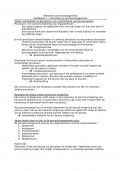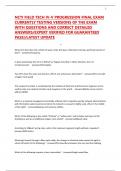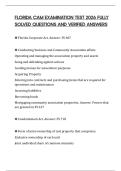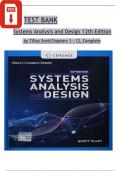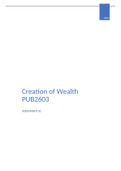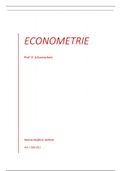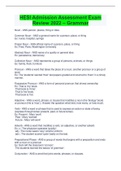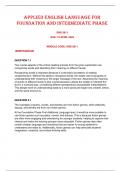QUALITY ANSWERS PROVIDED
01 NOVEMBER 2023
FOOTNOTES BIBLIOGRAPHY
, QUESTION 1
The Third World Approaches to International Law (TWAIL) is a movement that seeks
to challenge the Eurocentric approach to international law 1.28 It has three main
objectives 2. First is to challenge the way international law has been used as a
medium to perpetuate racialised/racist hierarchy of international norms 3.29 Second,
it seeks to construct and present an alternative legal structure for international
governance 4.30 Thirdly, it seeks to use scholarship, policies and politics to eradicate
the conditions for underdevelopment in the third world
Third World Approaches to International Law (TWAIL) is a critical and
multidisciplinary perspective on international law and its relationship with the Global
South, which emerged in the late 20th century. It offers a counter-narrative to the
dominant Western-centric approach to international law and focuses on addressing
the historical, political, and economic disparities between the so-called "First World"
and the "Third World." 5To understand the fundamental objectives and
characteristics of TWAIL scholarship and political action, we can break it down into
several key aspects:
TWAIL scholars aim to decolonize international law by challenging the Eurocentric
biases that have historically been prevalent. They argue that the discipline has
primarily served the interests of Western powers, ignoring or marginalizing the
concerns of the Global South. TWAIL seeks to rectify this by acknowledging diverse
worldviews and experiences. 6TWAIL scholars emphasize the importance of
historical context and structural factors in understanding international law. They
critique the way global institutions and legal systems have been structured to favor
Western countries, resulting in unequal power relations. By examining the historical
roots of international law, TWAIL aims to expose its deeply rooted injustices.
A central objective of TWAIL is to promote justice and equity in international law.
This includes addressing issues such as economic inequality, neocolonialism, and
the exploitation of resources in the Global South by more powerful nations. TWAIL
scholars advocate for reforms that rectify these imbalances.7 TWAIL promotes
solidarity among Global South countries and advocates for collective action. It seeks
to empower these nations to assert their interests in international forums and to
challenge the dominance of Western powers. This empowerment can take various
forms, including diplomatic negotiations, trade agreements, and advocacy for self-
determination.8 TWAIL recognizes the interconnectedness of various forms of
oppression and inequality, such as racism, gender discrimination, and economic
1 What is TWAIL? / M. Mutua. American Society of International Law Proceedings 94 (2000), pp. 31-38
2 What is TWAIL? / M. Mutua. American Society of International Law Proceedings 94 (2000), pp. 31-38
3 What is TWAIL? / M. Mutua. American Society of International Law Proceedings 94 (2000), pp. 31-38
4 What is TWAIL? / M. Mutua. American Society of International Law Proceedings 94 (2000), pp. 31-38
5 What is TWAIL? / M. Mutua. American Society of International Law Proceedings 94 (2000), pp. 31-38
6 What is TWAIL? / M. Mutua. American Society of International Law Proceedings 94 (2000), pp. 31-38
7 What is TWAIL? / M. Mutua. American Society of International Law Proceedings 94 (2000), pp. 31-38
8 What is TWAIL? / M. Mutua. American Society of International Law Proceedings 94 (2000), pp. 31-38


